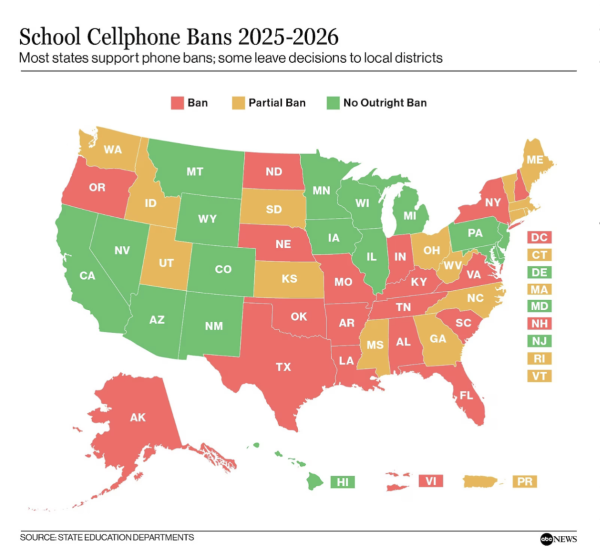
A study done by the National Health Interview Survey–Teen (NHIS–Teen) from July 2021 to December 2023 found that about half of teenagers ages 12–17 had daily screen times that were 4 hours or more. This is concerning when taking into consideration the fact that 1 in 4 teenagers with 4 or more hours of screen time have experienced anxiety or symptoms of depressions. In this day and age, where there are 4.88 billion smartphone users globally, the question of the benefits and consequences of allowing children and teens unregulated access to phones in schools becomes an increasingly prominent issue. Phones have drastically impacted our lives, giving billions of people opportunities for social connection and entertainment. However, are the advantages phones bring to the table worth the damages done to students’ well-being and academic performance?
Advantages of Restricting Phone Usage
As discussed before, phone usage has drastically impacted the way students interact with each other and how they spend their time. One consequence that has emerged as a result of increased digital connection has been the rising prominence of cyberbullying. According to UNESCO, this style of bullying has become increasingly widespread, affecting about 10% of children globally. In many cases phones have become modes for escalating conflicts, with students scheduling and recording fights via social media. The New York Times found that in the over 400 school fight videos they reviewed, there was a common theme of middle school and high school students using social media and phones to provoke and spread footage of harsh beatings. Thus, restricting phone usage limits this method of conflict escalation, providing students with some level of protection.
In addition, restricting phone usage in schools can help students progress their educational goals. Phones are undeniably distracting and take up considerable mental space, making it harder for users to focus on and complete other tasks. Even just the effort put into avoiding the temptations of using a phone negatively affects a person’s working memory and functional fluid intelligence, or ability to reason and think flexibly. Things like notifications, alarms, and texts divert student attention. Having these constant distractions can worsen student performance in school and prevent them from absorbing the material being taught to them. Especially the still developing brains of younger students make it increasingly harder for them. Thus, restricting cell phone usage in schools can eliminate a prominent hindrance in students’ capacity to reach their full academic potential: an inability to focus.

Disadvantage of Restricting Phone Usage
However, there are still some notable consequences that might arise as a result of restricting phone usage in schools. First of all, completely banning phones can make it difficult for students to contact their guardians or important services in the event of an emergency. With the issue of school shootings being a prominent concern in the psyche of many parents, it’s no wonder why many of them are so adamant in their opposition to banning phones. Out of adults ages 18 to 49 who oppose banning phones, over 60% of them share the sentiment that parents should be allowed to contact their children during school hours via phones. In addition, for students, it’s much easier to make plans regarding after school sports, clubs, and activities when they have a clear mode of communication with their parents. Banning phones could lead to more scheduling issues and miscommunication between students and parents.
Moreover, banning phone usage can lead to children becoming less digitally literate. In a world where technology is rapidly evolving, it’s important for students to learn the opportunities and risks that come with technology, and shielding children from technology will only put them at a disadvantage later down the line. Students need to be given the opportunity to think critically and practice self-control in order to become responsible digital citizens. Banning phones promotes fear of new technology, and it’s just an unreasonable regulation to place on students in an increasingly digital world.

Cell phones have undoubtedly become an essential component of modern society and have forever shaped the way we stay informed and how we connect with others. However, it’s important to weigh the potential benefits and consequences new technologies entail before proceeding forward because progress should never come at the expense of the youth.
See Sources for More Information:
https://www.cdc.gov/nchs/products/databriefs/db513.htm#section_1
https://www.britannica.com/procon/cell-phones-debate
https://news.un.org/en/story/2024/11/1156591
https://www.verywellmind.com/fluid-intelligence-vs-crystallized-intelligence-2795004
https://www.bbc.com/news/articles/c93lzyxkklpo
https://www.scientificamerican.com/article/do-school-phone-bans-help-students/


